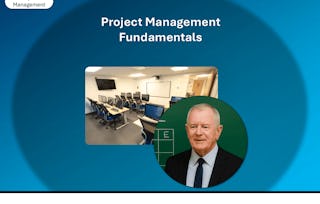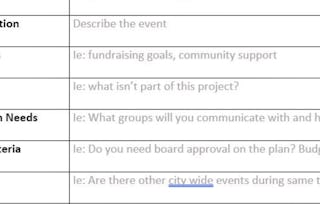Projects are all around us. Virtually every organization runs projects, either formally or informally. We are engaged in projects at home and at work. Across settings, planning principles and execution methodologies can offer ways in which projects can be run more effectively and efficiently. Project management provides organizations (and individuals) with the language and the frameworks for scoping projects, sequencing activities, utilizing resources, and minimizing risks.

Fundamentals of Project Planning and Management

Fundamentals of Project Planning and Management

Instructor: Yael Grushka-Cockayne
Access provided by Abu Dhabi National Oil Company
383,531 already enrolled
10,382 reviews
Recommended experience
What you'll learn
How to initiate, define and organize a project
How to develop a project plan, including scoping, sequencing tasks, and determining a critical path
How to assess, prioritize and manage project risk
How to execute projects and use the earned value approach for monitoring and controlling progress
Skills you'll gain
- Dependency Analysis
- Planning
- Earned Value Management
- Stakeholder Analysis
- Project Management
- Risk Management
- Project Scoping
- Scheduling
- Kanban Principles
- Stakeholder Management
- Agile Methodology
- Project Schedules
- Risk Analysis
- Project Planning
- Project Risk Management
- Skills section collapsed. Showing 10 of 15 skills.
Details to know

Add to your LinkedIn profile
5 assignments
See how employees at top companies are mastering in-demand skills

There are 4 modules in this course
Welcome to the course -- we're excited you're here! In our first week, we'll gain an understanding of what a project is, what it isn't, and why that matters. We'll consider how projects are defined and a project’s three objectives. We'll look at a model for examining a project’s organization and its stakeholders, and then analyze those stakeholders using a power/interest grid. We'll look at the main reasons why many projects fail and then learn how to measure success. Finally, we'll review the key stages in the project life cycle and highlight the important features of each stage.
What's included
8 videos4 readings1 assignment3 discussion prompts
During our second week, we'll start digging into the details, focusing on how to develop a project plan. We'll understand why we plan and what a plan should or should not include. We'll discuss the process of scoping out a project and see tools that can help us identify what should be included in our project. We'll learn about sequencing project tasks and the nature of the dependencies among project activates. We'll learn how to determine a project’s duration and critical path, how it is determined, and why it is useful. We'll see how we should schedule a project and, finally, we’ll review how you can make changes to a plan to support your overall project objectives.
What's included
9 videos1 reading1 assignment1 discussion prompt
In our third week, we'll consider the risk and uncertainties projects face. We'll understand what is risky about projects. We'll identify and assess project risks and prioritize these risks in order to focus our attention on those most impactful to the project. We’ll consider schedule risks in detail and ask, "What is the likelihood of finishing on time? What are the drivers that may cause delays in my project?" We'll see how a project budget can be set to include a contingency. Finally, we'll consider situations with a high degree of ambiguity and identify methods than can useful in these situations.
What's included
9 videos1 reading1 assignment1 discussion prompt
In our final week, we'll move from plan to action and consider the execution phase of a project. We'll learn about the earned value approach for monitoring and controlling progress. We'll consider the individuals who are executing the project and how their habits impact project progress. We'll discuss some alternative methods for project execution such as Agile, Scrum, and Kanban. Finally, we'll review and summarize the course, and our journey from project definition through execution and completion.
What's included
9 videos2 readings2 assignments2 discussion prompts
Instructor

Offered by
Why people choose Coursera for their career

Felipe M.

Jennifer J.

Larry W.

Chaitanya A.
Learner reviews
- 5 stars
78.51%
- 4 stars
18.93%
- 3 stars
1.85%
- 2 stars
0.30%
- 1 star
0.38%
Showing 3 of 10382
Reviewed on May 21, 2020
This was an excellent course. Very enriching, captivating and full of value. The professor Mrs. Yael Grushka-Cockayne has a very engaging teaching style, I loved listening to her. Thanks professor!
Reviewed on Sep 6, 2020
Very informative, concise, and easy to digest. Provides a solid foundation / framework for approaching projects, with great tutorials on using software for analysis. Great experience overall, thanks!
Reviewed on May 12, 2022
I really enjoy the case stuties review but there has to be more reading materials(Books & articles) and related assignments plus quiz inorder to make the student know the details of course.
Explore more from Business

Johns Hopkins University

Logical Operations



